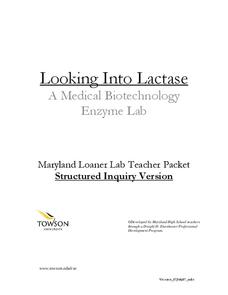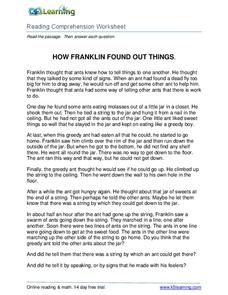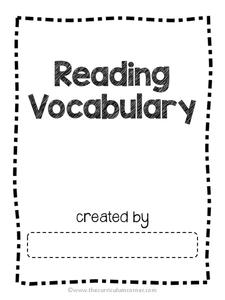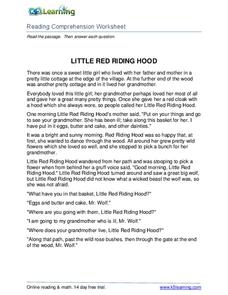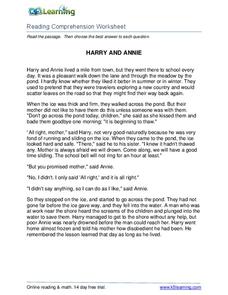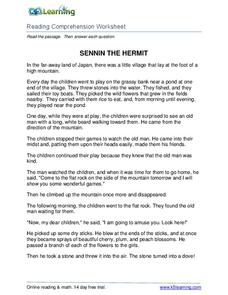Towson University
The Wildlife Forensics Lab
Can science put an end to the poaching of endangered species? Show your young forensic experts how biotechnology can help save wildlife through an exciting electrophoresis lab. Grouped pupils analyze shark DNA to determine if it came...
Towson University
Looking Into Lactase: Structured Inquiry
Why is lactase important? Biology scholars explore enzyme function in a structured inquiry lab. The activity tasks lab groups with observing how temperature and pH affect enzyme activity, as well as determining which milk products...
Towson University
Case of the Crown Jewels
Can your biology class crack the Case of the Crown Jewels? Junior forensics experts try their hands at DNA restriction analysis in an exciting lab activity. The lesson introduces the concept of restriction analysis, teaches pipetting and...
Towson University
Mystery Tubes
How do scientists know they're right? Truth be told, they don't always know. Explore the scientific process using mystery tubes in an insightful activity. Young scientists discover how to approach and solve problems in science, how ideas...
Towson University
Looking Backwards, Looking Forward
How do scientists know what Earth's climate was like millions of years ago? Young environmental scholars discover how researchers used proxy data to determine the conditions present before written record. Grouped pupils gain experience...
Teacher's Corner
Hey Batter, Wake Up!
Does jet lag affect a baseball team's performance in games? Read about how a baseball team's chance of winning a game can be affected by traveling over one, two, and three time zones. Readers then respond to five short answer questions...
K5 Learning
Susy Brown
Susy is always at home taking care of her baby sibling. Even when mom is home, Susy has to take care of the baby. Luckily for Susy, she has good friends. After reading about Susy's duties, learners respond to four questions that require...
K5 Learning
How Franklin Found Out Things
Franklin learns about the world by making observations, and so do we! A short reading assignment prompts fourth graders to answer comprehension questions about a curious boy and what he notices.
American Physiological Society
Did I Observe it or Infer it?
Take the mystery out of inquiry! When young scientists learn to use their keen powers of observation to make smart inferences about a situation, they are well on their way to understanding what the scientific method is all about. Using...
NOAA
Journey to the Unknown
What's it like to be a deep-sea explorer? Tap into the imaginations of your fifth and sixth graders with a vivid lesson, the second part of a six-part adventure. Learners close their eyes and submerge themselves in an expedition aboard...
California Education Partners
Eleven
It is difficult to articulate how growing up feels as accurately and beautifully as Sandra Cisneros does in her short story "Eleven." After seventh graders read the story and note the author's use of figurative language, they respond to...
NOAA
Animals of the Fire Ice
When the sun's rays can't reach the producers in a food web, where does all the energy come from? Extreme environments call for extreme food sources. Young scientists investigate creatures that appear to get their energy from methane...
NOAA
Off Base
How does carbon dioxide affect the world's oceans? The final installment in a series of six lessons has pupils research ocean acidification, then conduct an experiment to witness the delicate balance that exists in our seas. Materials...
NOAA
History's Thermometers
How is sea coral like a thermometer? Part three of a six-part series from NOAA describes how oceanographers can use coral growth to estimate water temperature over time. Life science pupils manipulate data to determine the age of corals...
Columbus City Schools
Sedimentary Rocks
Turn your class discussion of rock formation from ho-hum to holy hornfels! Junior geologists gain experience in identifying rock types and rock origins, with an emphasis in hypothesizing the environment needed to form certain rocks. The...
Curriculum Corner
Inferencing
Inferencing is a necessary reading skill to uncover non-explicit messages in text. Use the set of resources as a way to guide learners toward becoming expert inferrers through reading prompts and literature with text and without text.
Curriculum Corner
Riddle Cards
What better way to introduce making inferences than with riddle cards? Young readers practice making inferences through riddle cards and other types of reading, while filling out graphic organizers. The resource even comes with blank...
Federal Reserve Bank
Arts and Economics Infographic Questionnaire
How do careers in the arts contribute to America's gross domestic product? Use an informative infographic that details the economic details of careers in the core arts, including design services, performing arts, and arts education, to...
University of Georgia
Using Freezing-Point Depression to Find Molecular Weight
Explore the mathematical relationship between a solvent and solute. Learners use technology to measure the cooling patterns of a solvent with varying concentrations of solute. Through an analysis of the data, pupils realize that the rate...
Curriculum Corner
Academic Reading Vocabulary
From A to Z, learners define, draw, and find examples of specific reading focus skills in an alphabetized reading vocabulary packet. Words include dialogue, theme, text structure, genre, paraphrase, and many more.
K5 Learning
Little Red Riding Hood
Little Red Riding Hood brings lovely treats to her grandmother, and valuable reading skills to your pupils. After reading the short fairy tale, fifth graders answer four comprehension questions.
K5 Learning
Queen Hulda and the Flax
Choosing humility over outstanding wealth can be beneficial in the long run. Elementary pupils practice reading comprehension with a short fairy tale about Queen Hulda and her gifts to a poor shepherd, and demonstrate their ability to...
K5 Learning
Harry and Annie
Henry and Annie are on thin ice—literally! Read about the siblings' winter walk and the importance of staying safe with a short passage and four follow-up questions.
K5 Learning
Sennin the Hermit
Introduce learners to the magical Japanese hermit named Sennin with a reading response activity. As fifth graders finish the story of Sennin and his mystical powers, they answer four short-answer questions.



